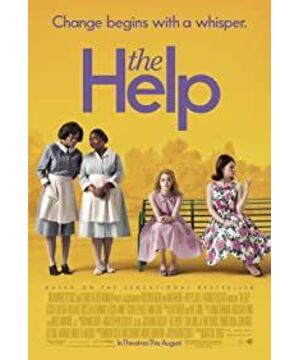There is no insurmountable gulf between us. I vaguely remember that this was what I wrote down in my notebook after reading the book "The Help". Xiaowen's bravery, Abby's strength, Minnie's fiery temper, Celia's ignorance and kindness, Celia's bitterness, and the countless ladies of Jackson Town who succumbed to Celie's arrogance, are in the film's evolution. In the beginning, the memory was aroused little by little, and those vivid characters suddenly unfolded and emerged in front of my eyes, and I found some kind of familiar feeling.
As an individual preconceived by books, there are always different degrees of criticism of movies and their actors. It is true that the cast of this movie was well chosen, Abby is what I imagined she was, and I think she is the essence of the book, she chose the right one, and the movie was a success. It's just that the skeeter in the book is skinny, has terrible hair, and often wears not-so-pretty dresses. Emma Stone is obviously a beauty in the movie. Minnie's acting is in place, and her hot temper is evident. Overall, most of this movie is still loyal to the book, and I like it as a whole.
It's ironic that a person who is passionate about African children's welfare is actually a person of color. Celie is such a person. She is selfish, vain, and arrogant. In order to resist the germs they imagined, she has to build a separate bathroom for the black servants to avoid infection. She fired Minnie because Minnie used her toilet on a stormy night. Donating clothes to African children and pretending to be enthusiastic about this public welfare undertaking, ignoring Celia's enthusiasm, ignoring the difficulties of the servants, and being as ignorant and ruthless as a hen who only knows how to please flattery.
On her body, countless labels that read "discrimination" were stuck to her skirt, pants, and face. Racial discrimination is dehumanizing, even if there is no racial discrimination, whether in the United States, in China, or even in Greece two thousand years ago, discrimination can be seen everywhere in life. The disadvantaged groups in China, the humble individuals who are gradually being forgotten in society, are not only discriminated against in their interactions in life, but also full of prejudice about whether they have the right to get feelings.
I am reminded of Lincoln's 1863 address at Gettysburg, where he said, "Fourscore and seven years ago, our fathers brought forth upon this continent a new nation, conceived and dedicated into the proposition that all man are created equal." Everyone Born equal. It's also why so many black people were heartbroken after Lincoln was shot.
Today, in Huang Jiwei's collection of words, I saw such words: "'Discrimination' is like a virus, which can hardly be wiped out. It will always exist, just more or less, or less or more." At times, they all warned us that the premise of a good existence in this world is to admit the injustice of this world. Only in our minds, our own independent minds, it is up to us to decide whether it is fair or not.
There are many moving things about this story. At the end of the movie, Abby didn't silently endure Hilly's groundless accusation, but stood up to defend himself and spoke his inner voice, saying "ain't you tired, Miss Hilly, ain 't you tired' beats Celie to the ground. Her inner monologue as she walked out of Miss Leeflot's house: "God says we need to love our enemies, but that's hard to do. No one had ever asked me what it felt like to be me. Once I told the truth about that... I felt free. "Freedom comes with a price, Abby's price is lost job, the situation may become difficult, but what is more valuable than freedom?
View more about The Help reviews






